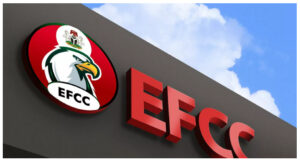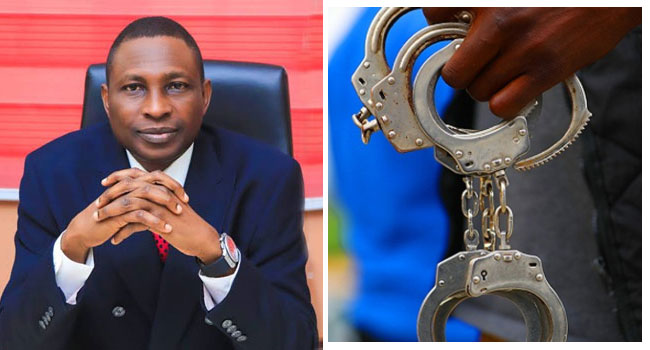The Economic and Financial Crimes Commission (EFCC) has raised alarm over the involvement of bank executives in aiding money laundering activities across Nigeria. The EFCC’s Chairman, Ola Olukoyede, disclosed that investigations conducted by the commission have uncovered significant complicity among bank officials, not just in money laundering but also in illicit foreign exchange sales and unauthorized trading. As a result, the EFCC is preparing to take decisive legal action, with plans to commence prosecutions against these executives in the coming weeks.
Olukoyede made these remarks during the 17th annual conference of the Chartered Institute of Bankers of Nigeria (CIBN), where he expressed concern over the role financial institutions play in perpetuating large-scale financial crimes. He urged the CIBN to tighten its regulatory oversight to ensure that its members are not complicit in fraudulent activities. According to the EFCC chief, the majority of financial crimes in Nigeria are funneled through the banking system, making the sector a critical focus in the fight against corruption.
 In an impassioned address, Olukoyede stressed the importance of reforms within the banking sector to curb such practices. He underscored that these malpractices are not isolated but part of a larger network of illicit financial flows. He also reiterated the need for internal regulatory bodies, such as the CIBN, to work more closely with law enforcement agencies to ensure the integrity of the nation’s banking system. Failure to do so, he warned, would only exacerbate the problem, making financial institutions easy conduits for laundering proceeds of crime.
In an impassioned address, Olukoyede stressed the importance of reforms within the banking sector to curb such practices. He underscored that these malpractices are not isolated but part of a larger network of illicit financial flows. He also reiterated the need for internal regulatory bodies, such as the CIBN, to work more closely with law enforcement agencies to ensure the integrity of the nation’s banking system. Failure to do so, he warned, would only exacerbate the problem, making financial institutions easy conduits for laundering proceeds of crime.
As part of broader efforts to tighten anti-corruption measures, the EFCC has called on the National Assembly to expedite the passage of laws that would institutionalize the government’s whistle-blower policy. This proposal was made during a recent address by Olukoyede at the Nigerian Bar Association (NBA) conference held in Lagos. He highlighted that once the whistle-blower law is enacted, it would mandate all law enforcement agencies to provide protection for individuals who come forward with information on financial crimes. This step, he argued, is crucial in creating a safer environment for whistle-blowers and fostering accountability within the financial sector.
In his address to the legal community, the EFCC chairman did not mince words when cautioning lawyers to exercise greater responsibility in their professional practices. He emphasized the importance of due diligence, particularly in the context of Anti-Money Laundering (AML) and Counter-Terrorism Financing (CTF) regulations. Olukoyede urged lawyers to fully investigate the backgrounds of their clients to avoid unintentionally enabling money laundering or other financial crimes. He highlighted that such measures are essential for maintaining the integrity of legal professionals and protecting the sanctity of the legal system.
“As lawyers, we hold positions of trust and must always ensure that we are acting in the best interest of the law and the nation,” he said. He further warned legal practitioners against offering protection to individuals suspected of financial crimes, stating that their duty is not to shield criminals but to uphold justice. “If you know the whereabouts of individuals wanted by the EFCC, it is your responsibility to bring them forward. Protecting such individuals only undermines the integrity of your profession and the nation as a whole.”
Olukoyede also addressed a widespread misconception about international conventions, particularly regarding Nigeria’s placement on financial grey lists. He emphasized that adhering to proper legal practices and enforcing local financial laws would naturally lead to compliance with international standards. “Doing what is right within our borders will help us clear our name internationally. You don’t need to focus solely on international conventions—if you follow the law, the results will speak for themselves,” he explained.
Furthermore, the EFCC chairman reiterated that lawyers must ensure their fees are sourced from legitimate, verifiable avenues. He pointed out that if legal practitioners fall victim to crimes themselves, they would better understand the far-reaching consequences of engaging with clients involved in illegal activities. “Knowing your clients is paramount,” he stressed. “You are not expected to accept payments from sources that you cannot trace back to legitimate means.”
Olukoyede also took time to discuss the Money Laundering Act, highlighting that while the Act has certain stipulations, it does not preclude the EFCC from enforcing financial regulations. He assured that the commission remains committed to its mandate of fighting corruption, and it will continue to collaborate with various stakeholders to enhance the legal framework that supports anti-corruption efforts in Nigeria.
The EFCC’s stance signals a new chapter in the battle against financial crimes in Nigeria, where financial institutions and their executives are now squarely in the crosshairs. As the commission readies itself for a wave of prosecutions, it remains to be seen how the banking sector will respond to these revelations and whether internal reforms will be swiftly implemented to avert further complicity in illegal activities. The forthcoming prosecutions, if successful, could set a new precedent for accountability within Nigeria’s financial sector and reinforce the country’s efforts in combating financial crimes.




